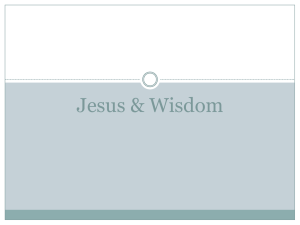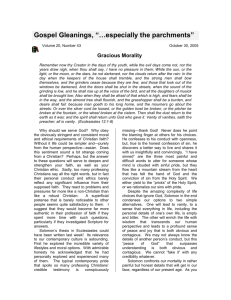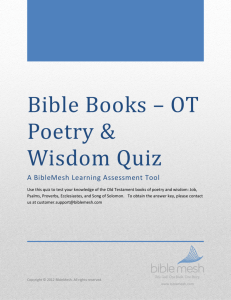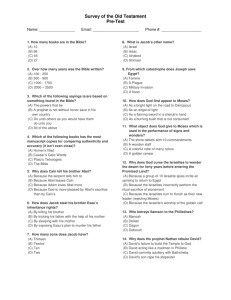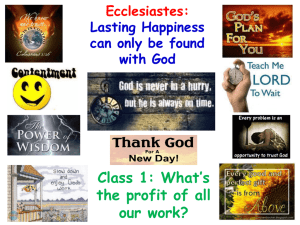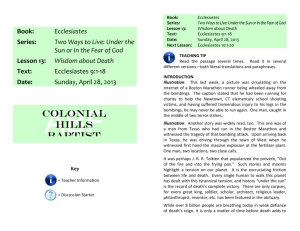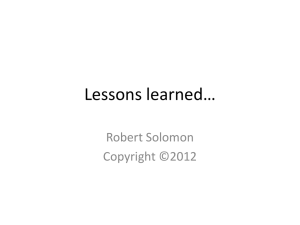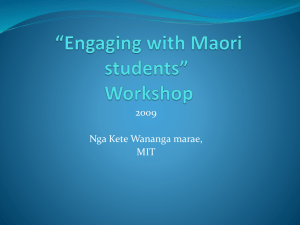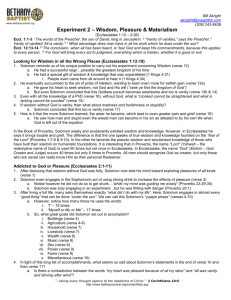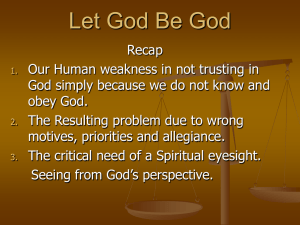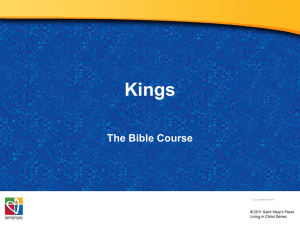Leader Lesson Ecc 6-7
advertisement
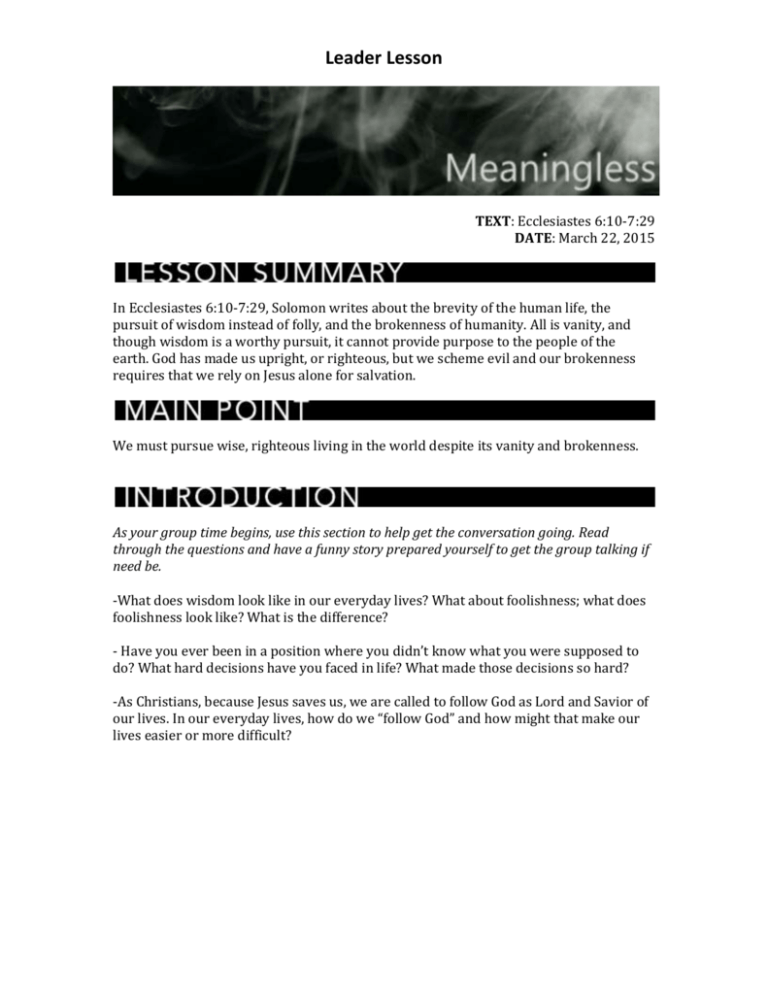
Leader Lesson TEXT: Ecclesiastes 6:10-7:29 DATE: March 22, 2015 In Ecclesiastes 6:10-7:29, Solomon writes about the brevity of the human life, the pursuit of wisdom instead of folly, and the brokenness of humanity. All is vanity, and though wisdom is a worthy pursuit, it cannot provide purpose to the people of the earth. God has made us upright, or righteous, but we scheme evil and our brokenness requires that we rely on Jesus alone for salvation. We must pursue wise, righteous living in the world despite its vanity and brokenness. As your group time begins, use this section to help get the conversation going. Read through the questions and have a funny story prepared yourself to get the group talking if need be. -What does wisdom look like in our everyday lives? What about foolishness; what does foolishness look like? What is the difference? - Have you ever been in a position where you didn’t know what you were supposed to do? What hard decisions have you faced in life? What made those decisions so hard? -As Christians, because Jesus saves us, we are called to follow God as Lord and Savior of our lives. In our everyday lives, how do we “follow God” and how might that make our lives easier or more difficult? Leader Lesson Spend time beforehand reading through the text and answering these questions so you are prepared when you lead. Also, think through the potential questions your people may ask. Immediate Context: Ecclesiastes is a book without an explicitly-named author, but millennia of Christian and Jewish tradition attribute the letter to Solomon, rightfully so. We are in the sixth and seventh chapters of Ecclesiastes today. In the broader context of this morning’s text, Solomon is observing the vanities of life and how we might think and live wisely amidst the vanity. > HAVE A VOLUNTEER READ Ecclesiastes 6:10-12 In verse 10, Solomon writes, “Whatever has come to be has already been named, and it is known what man is, and that he is not able to dispute with one stronger than he” (ESV). What does this mean, in your own words? The “naming” idea at the beginning of the verse is meant to show authority. Solomon is saying that there is only one Authority over creation, God, and to argue with him about wisdom, folly, or the pointlessness of life would be vanity. In verse 12, Solomon asks two questions. Try to summarize what he’s asking in that verse. Share with your group and try to reach a conclusion. Solomon is basically asking, “Who can tell man what is right and wrong or what comes after death?” The point being that no wise counsel is perfect, and Solomon knows, he’s probably had a good number of wise men counseling him. Also, this verse serves as a transition into chapter seven in which Solomon lists a number of proverbs about wisdom and folly. > HAVE A VOLUNTEER READ Ecclesiastes 7:1-13 What does this section remind you of? Why is that significant? Verses one through 13 are a series of Proverbs, which calls to mind the written wisdom of Solomon in the book of Proverbs. Which of the wise sayings in verses one through 13 stick out to you? Why? [Group gives their own answers. Encourage some discussion around these.] > HAVE A VOLUNTEER READ Ecclesiastes 7:14-29 Solomon’s list of proverbs continue into this portion of the text, but let’s focus on the last few verses of the chapter, verses 25-29. In verse 25, Solomon writes, “I turned my heart to know and to search out and to seek wisdom and the scheme of things, and to know the wickedness of folly and the foolishness that is madness” (ESV). What is Solomon saying, and how do we follow his lead on this? Solomon is saying, “I looked for wisdom. I tried to figure out how the world works. I tried to learn what is foolish and how foolishness leads to insanity.” We can follow Solomon’s lead here by praying and asking the Lord to give us wisdom and give us discernment to identify foolishness. Leader Lesson Solomon makes a big statement in the final verse of chapter seven when he says, “God made man upright, but they have sought out many schemes.” What is Solomon saying, and how does this play into God’s plan for the world? Solomon is saying that in all of his life: his riches, his wisdom, his folly, his pursuit of knowledge, that what he has learned is that God made man righteous, but man has rebelled against God, throwing everything out of whack. Because of our rebellion and “scheming” against God, he sent his Son Jesus to save us from our sins, providing meaning to life. Help your group identify how the truths from the Scripture passage apply directly to their lives. Create some talking points for the group by looking at the practical implications of the lesson. Get group members to talk about the real life implications of the passage. Look also at what can be applied specifically in context to the faith family at Fairview. 1. Look at the list of wisdom sayings in Ecclesiastes 7:1-13 again. Which of these might you write down and look at a few times this week? Which one of these could be most helpful in your pursuit of wisdom? 2. At the end of Ecclesiastes 7, Solomon says that one thing he has learned in his pursuit of riches and wisdom is that though God made man upright, or righteous, we are broken. This week, how might you rely on God to uphold you despite your brokenness? 3. Throughout our study of Ecclesiastes, it’s been pretty clear that not much of our lives has much purpose outside of Jesus. How does following Jesus give your life purpose? Think about what your upcoming week looks like. How can you live with eternal purpose this week? Ecclesiastes 7:29: “See, this alone I found, that God made man upright, but they have sought out many schemes.” (ESV) Close your time in prayer. Pray that each of you would find ways to share Christ and glorify God in the ordinary tasks of life and work. Pray that your community group would find ways to encourage and support each member to work and seek wisdom in such a way that points others to Jesus. Pray that all of us ordinary, unexpected people at Fairview Church will would be used by God to make a difference in our community, nation, and world through our work. Leader Lesson Midway through this week, you might consider sending a follow-up note/phone call/email to your group with some application points you group came up with from the lesson. Challenge them to memorize Ecclesiastes 7:29. Next week’s sermon is from Ecclesiastes 11:7-12:14.
